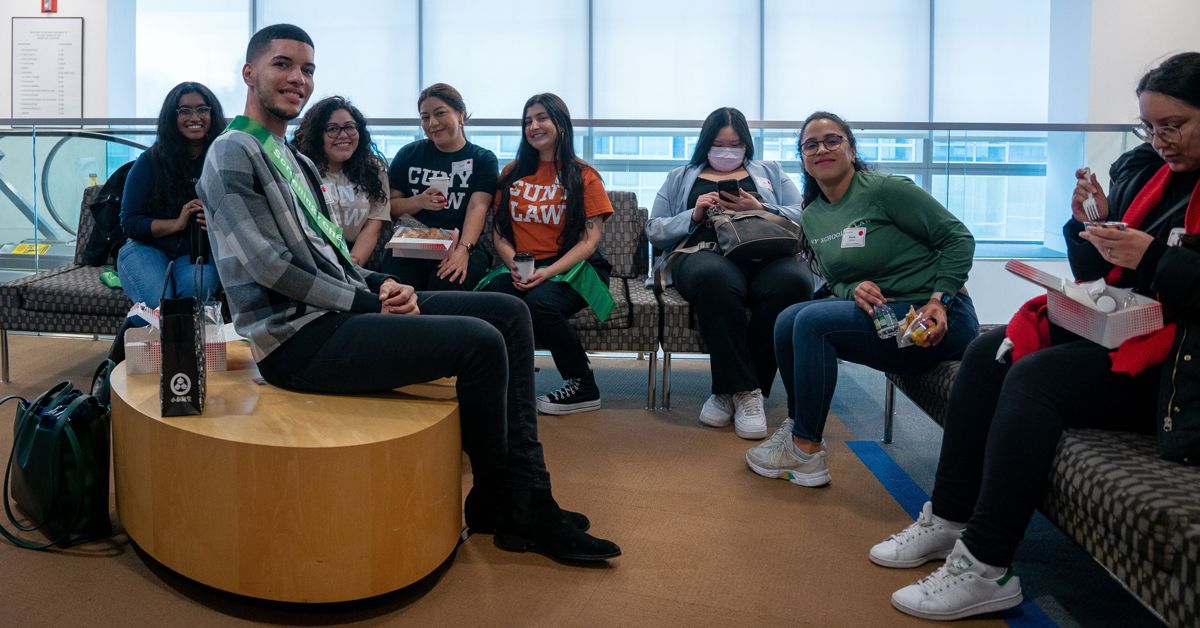
CUNY Law students, many of whom have personal connections to and experiences with immigration and citizenship, volunteer with CUNY Citizenship Now!
Imagine a program that helps immigrants navigate the complex and often overwhelming world of immigration law for free, and often in their first language. Now, imagine that this program is powered by immigrants themselves, along with first-generation students, DACA recipients, and CUNY alumni with personal connections to the work. This is precisely what the City University of New York Citizenship Now! (CN!) program does, supporting nearly a quarter of a million immigrants across New York City’s five boroughs. Created more than 25 years ago as a CUNY initiative designed to help its students and their families access the economic mobility engine. This unique initiative is the largest university legal assistance program in the nation, driven by a passionate team of attorneys, paralegals, and students from CUNY Law.
And while the program itself is singular, the many people who make it possible are remarkable.
More than 100 staff and volunteers have gathered at CUNY Law to help the 109 people signed up for the day’s sessions. Professor Janet Calvo, one of the major forces of citizenship and immigration advocacy at the Law School and across CUNY, welcomes the buzzing crowd before an American flag draped above the escalators. She introduces more of the people who have made the day possible. Among them are her co-professor Tamara R. Bloom ’04, CCN!’s Managing Attorney of Community Events; a cadre of alumni attorneys, including Midori Hills ’01, Maggie Kawinski ’05, and Luz E. Medrano ’05; and a room of volunteers, many of whom are former and current Law Students. It’s a family affair.
Everyone dons their color-coded sash, designating their role for the day, such as: applications, screenings, and check-out. Spread throughout rooms on the third floor, they wait for arrivals.
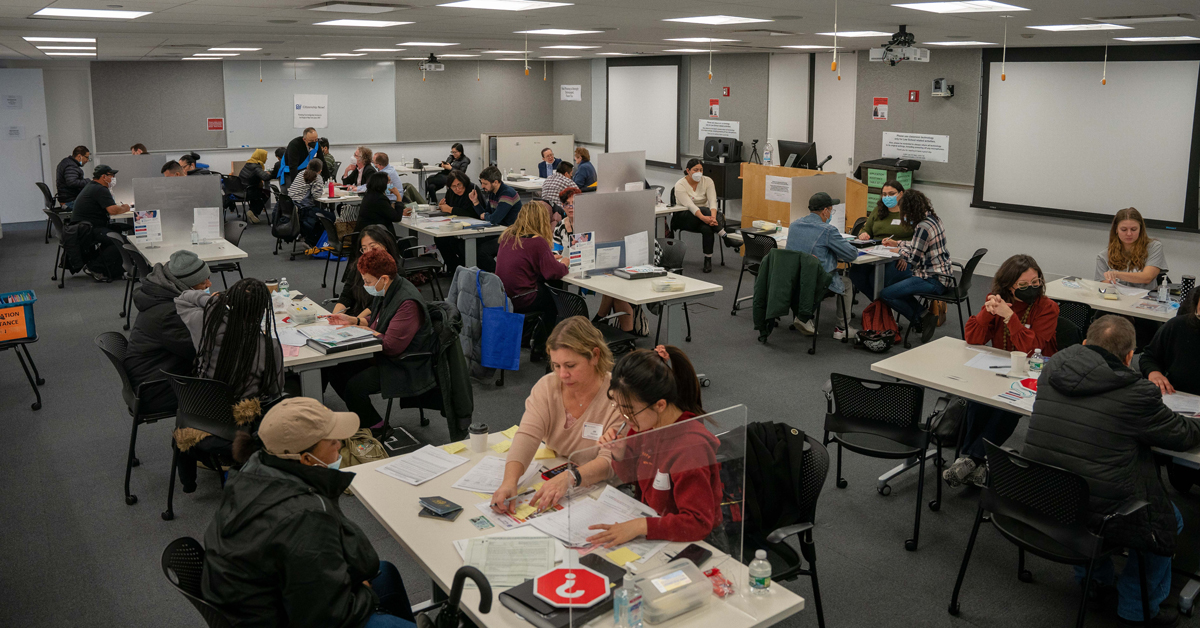
Professor Calvo and Bloom begin their rounds, making a special point to check in on the sixteen students currently enrolled in their Lawyering Seminar III offering Citizenship and Naturalization Practicum. Designed in 2018 by Calvo and then-Dean of Academic Affairs Professor Ann Cammett, it provides a reality-based component for direct legal service provisions for full- and part-time students while establishing a sustainable, student-driven partnership with CN!. This is the class’s second time working with a CCN! day, and between their classroom discussions of data and policy, ethical considerations, and personal experience with advocacy work, they are more than ready for the task at hand.
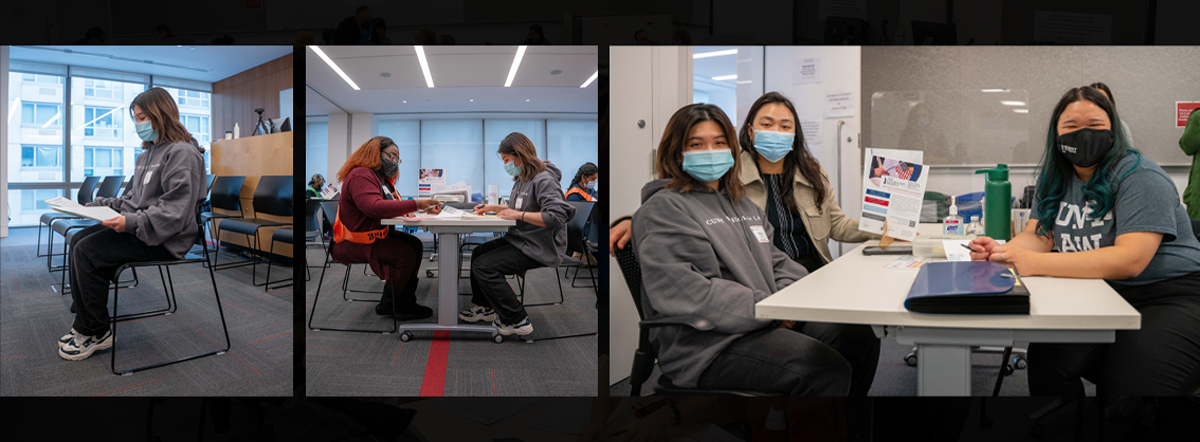
Patricia Padrinao, set to graduate in 2023, goes through the process of becoming a U.S. citizen with the help of her classmates and encouragement from Councilmember Julie Won.
Patricia Padrinao has been waiting for this day for a very long time.
She arrives with old and current passports, her lawful permanent resident card, and all of her travels and previous addresses and jobs are written down. And her brother. Together, they will fill out N-400 applications, volunteers will review each question slowly and with great care to ensure their eligibility and ask any follow-up questions, and then, at the end of a detailed check-out process, they will leave CUNY Law with their naturalization applications and USPS mailing envelopes, complete with the USCIS address already on it. All that will be left is to go to a USPS location and pay the mailing fee.
“It definitely feels different coming in as a participant and bringing my younger brother with me. Although I see familiar faces, knew what to expect with application assistance, and I’m in a familiar building, I can’t help but feel nervous and anxious.” But Padrinao is quick to add that “There’s some pride and joy in me bringing my brother to an event hosted at my Law School and him getting to meet my peers. Every CN! event always feels like one, big welcoming community, but this means a whole lot.”
Her family has been waiting for this opportunity for years; because of their non-citizen status, Padrinao and her brother were unable to get work permits, find fellowships, and explore funding and scholarship opportunities as they pursued their education. She plans to change that and explore working in federal legal positions after graduation, after becoming a citizen.
“My parents texted me and my brother ‘good luck!’ and ‘call us if you need anything, we will be on stand-by.’ But one text really stood out to me when my parents said ‘we are so proud of you both.'”
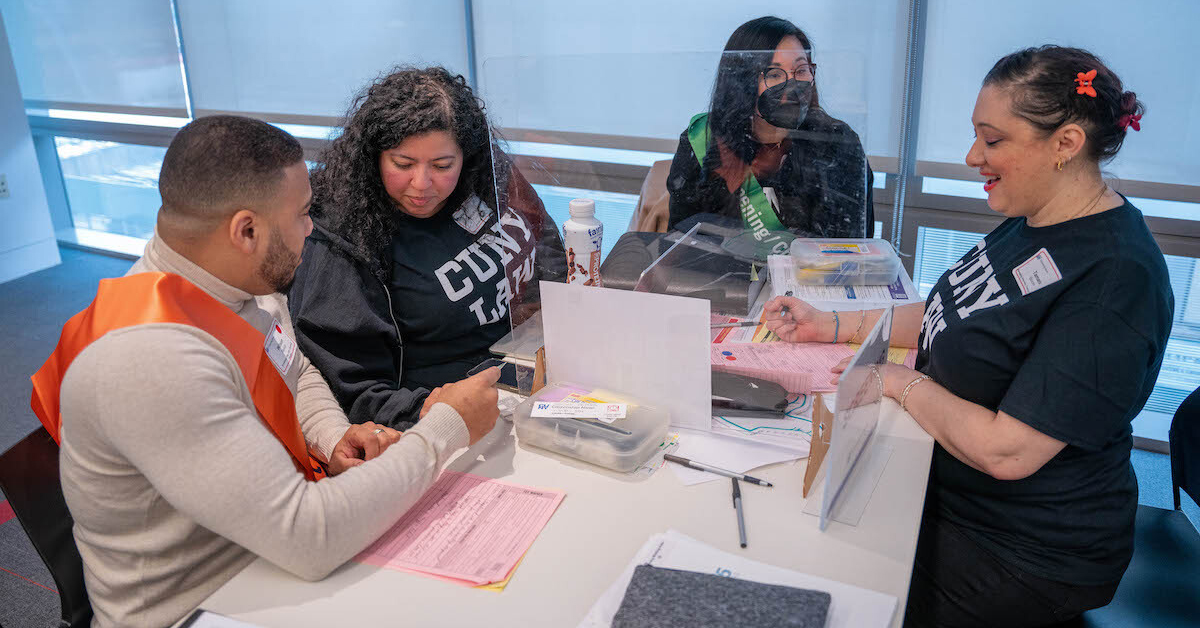
[right to left] Tamara Bloom ’04, Joana Lopez ’20, Soukaina Sourouri ’20, and a Citizenship Now! staff member hard at work
When she pops up an hour later, Bloom is flushed with success, her hair pinned up in colorful butterfly clips and her blazer gone. Having managed countless events like this, she knows what every event producer does: she’s there to circulate, connect people and problem-solving on the fly, though she is clearly itching to join her students and peers at the screening tables or the checkout line.
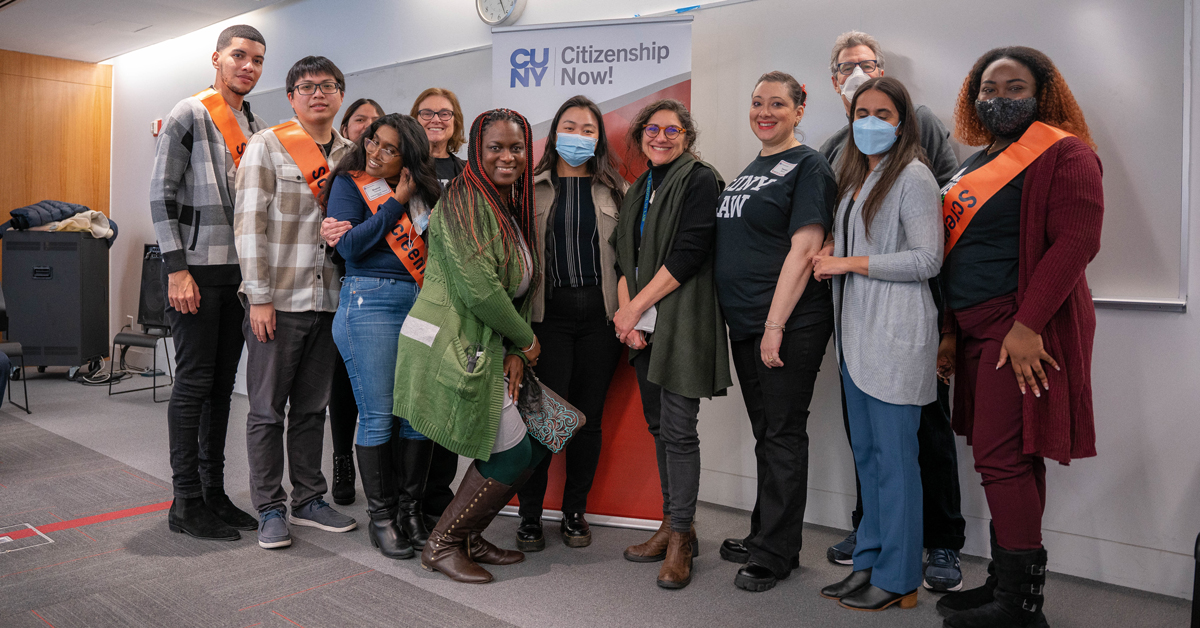
Councilmember Julie Won has arrived. Her advocacy for immigrants, migrants, and asylum-seekers in Queens includes supporting programs like CN! and calling on New York’s government to do better and do more. At a recent hearing on the migrant crisis in New York, she led questioning looking into hundreds of millions of dollars the city has spent on contracts for housing asylum seekers and providing them services. Both at the Law School and before the City Council, Councilmember Won spoke with urgency: accessibility and affordability are what matters—this work is necessary and we need you.
Joanna Lopez ’20 and Soukaina Sourouri ’20
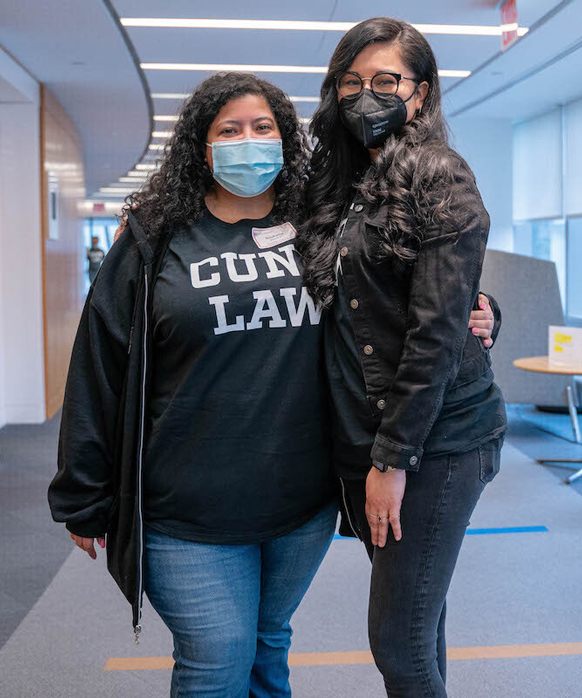
Immigrant Justice Fellow, Central American Legal Assistance; Owner of Sourouri Law Firm, P.C., respectively
When asked to pose for a photo, recent grads Joanna Lopez and Soukaina Sourouri loop their arms around one another, eyes crinkling and shoulders dropping, two close friends just happy to be spending their Saturday together doing what they love best. They’ve been each other’s hype women since their second year of Law School when they met in the Citizenship and Naturalization Practicum. They bonded over their unbridled ambition and vision for community-centered work. The next year, they returned as Teacher’s Assistants as they completed their law degrees in the early months of the COVID-19 pandemic.
Today, they are here as volunteers.
“CUNY actually helped my mom’s journey in naturalizing. When she was going through the process, I had one of the resource books and provided it to her. My sisters used it to make flashcards for her to help her understand what this process was going to look like for her. At the time, she didn’t want to naturalize because she didn’t feel comfortable with the English language—it is not our primary language spoken at home to this day. We nudged her because of the Trump Administration and wanting that security for her in the long run. I do think CCN!’s resources are what made the difference in her becoming a citizen. These events,” she gestures to the room of working teams, “are a breath of fresh air.” She grins behind her mask.
“We come back because it’s really important that organizations like CCN! get the funding that they deserve because of the work that they do within communities. That’s why we come back even without pay—we believe in this work. It’s free immigration services for communities that really need it—they help so many people in a single day. We both come from immigrant families, both first-generation and both the first attorneys in our families, so I won’t speak for Jo, but this work is important to my heart,” says Sourouri.
She’s just told me that she recently opened her own firm, to squeals and applause from Lopez beside her, just two years after being admitted to the NY Bar. Sourouri first worked as a court attorney in family court, where she was able to advise clients on the immigration consequences of orders of protection in their myriad forms, most of which bring tremendous complications. Her transition to owning her own practice will sound familiar to hundreds of CUNY Law alumni: even as she took classes Monday through Thursday nights, Sourouri spent her days gaining the other valuable experience needed to run her business.
“Before CUNY Law, I was a barista at a coffee shop who needed an internship to fulfill a college requirement. I made a connection with a customer and she brought me into her law practice to get to work. I went from intern to secretary to paralegal to office manager which let me learn business operations while working—and then I went to Law School at night. All of that at once.”
Lopez is looking on admiringly. “You made that happen,” she smiles. Sourouri laughs. “I love having my own practice. It’s been a dream since law school. It allows me to provide direct services to communities I want to serve and the one that raised me—which is Staten Island!”
Lopez has found a new community since moving to New York City to attend CUNY Law. In fact, she thought she would return to Phoenix, Arizona, but her plans have changed: she plans to stay here, doing this work, for as long as she can.
Currently in her third year as an Immigrant Justice Fellow at Central American Legal Assistance (CALA) representing asylum seekers, Lopez is handling two to eight asylum hearings each month—meeting with clients, getting relevant evidence from their home countries, preparing family members, preparing testimony, and more.
Most attorneys do one a month. Or one every few months.
Recent tectonic shifts in asylum-seeking have brought more than 50,000 people through New York City’s intake system since last spring, according to the Mayor’s Office. The city is reported to be providing more places for asylum-seekers to stay than any other city in the nation.
“The gravity of the hearings, knowing that people’s lives are at stake, and this fellowship with CALA solidified for me that this is what I want to be doing. And I have that foundation. I’m understanding the asylum shifts that are happening on a daily basis.”
Despite overflowing schedules and incalculable mental loads, they are here to volunteer 6 hours of their Saturdays to help others increase their sense of security and, in some cases, their sense of belonging.
 Keiris Munoz 2L
Keiris Munoz 2L
2023 Summer Fellow, Legal Services of Hudson Valley
“Prior to law school, I was a housing paralegal. I wanted to change gears to see whether I like the field of immigration. And I do, I love it.”
What Keiris Munoz likes most about the work is how it’s helped her community—she’s even benefitted from CNN! herself. “I’m Latino, I’m Hispanic— I filled out this same form two
summers ago and I’m a citizen right now. You are so proud to say that, you’re just proud. For me, it’s so full of joy and encouragement from being able to say I am a citizen who filled it out for myself.”
It’s clear that she is thrilled to be helping others—including CUNY students and Law School classmates—do the same. Her dedication to public interest work began when she became a CUNY Service Corps member in college, helping with one-shot deals through HRA to help tenants facing eviction. She worked alongside a CUNY Law alumnus who urged her to apply to the Law School.
 Carlos Vargas Galindo 3L
Carlos Vargas Galindo 3L
DACA Recipient, Make the Road Staffer
“I’ve been involved in the immigrant rights movement since 2010 when the DREAM Act was voted on in the House. That’s when I came to Make the Road because of its commitment to grassroots advocacy. My brother’s path here opened the door for me here. I saw there was such a need for immigrant services and attorneys.”
Carlos Vargas Galindo just completed his semester with the Immigrant & Non-Citizen Rights Clinic. He was thrilled to work with a teaching staff made of people he has admired throughout the movement.
“One of my supervisors said ‘You can’t learn what you think you know’ and I took that to heart. Professor Calvo is such an expert—and Professor Marie Mark, from the Criminal Defense Project, is a crimmigration pioneer.” He credits the faculty at the Law School with interrupting things he has been doing on repeat for years, from the Practicum’s scrutiny of the naturalization process, forms, and data to the clinic’s approach to policy advocacy.
“My litigation project explored marijuana and immigration and beforehand I hadn’t realized how much it impacts our community. It’s ‘hippie’ but it’s really not, if you look at the history, especially as a Mexican, it was associated with Mexicans and Latinos to vilify it. This system is about controlling bodies of color, from this substance to immigration issues.”
 Maria Barrientos-Alonso 2L
Maria Barrientos-Alonso 2L
Senior Coordinating Paralegal for the Mobile Legal Help Center, NYLAG
“Now I educate my attorney colleagues on why we have to tell our clients certain things. I was mind-blow that I came to class on Tuesday and on Wednesday I was already using what I had learned the night before,” Maria Barrientos-Alonso grins, quietly proud to be changing how clients are served even before she completes her degree. “CUNY makes it easier for evening students to mesh their academic and professional lives. Most of us are in a client-facing or public interest job. We love that. We come to school and it enables us and educates us even as we keep doing the work that we want to be doing.”
By day, Barrientos travels the five boroughs, bringing free legal resources to communities across the city. By night, Monday through Thursday, she hauls herself to Long Island City, where the last stop of her tour is in a classroom. She began doing immigration work in 2018 when she served as an intern for the Immigration Unit at the New York Legal Assistance Group (NYLAG) hosting citizenship clinics. This is what drove her to apply to Law School.
It’s clear she loves Professors Calvo and Bloom’s course.
“I get to see the policy and things we could potentially change one day.” Barrientos and her classmates are studying ethics and the levers of power that hold the potential for systems change. She’s eager to make her mark on the field of crimmigration, where she wants to help clients figure out their rights through free legal services. She sees the opportunity for preventative measures when people get their green cards, rattling off tips and tricks to help clients know their rights. “A simple mistake like stealing something can ruin someone’s life. It could bar them from citizenship. That’s not justice.”
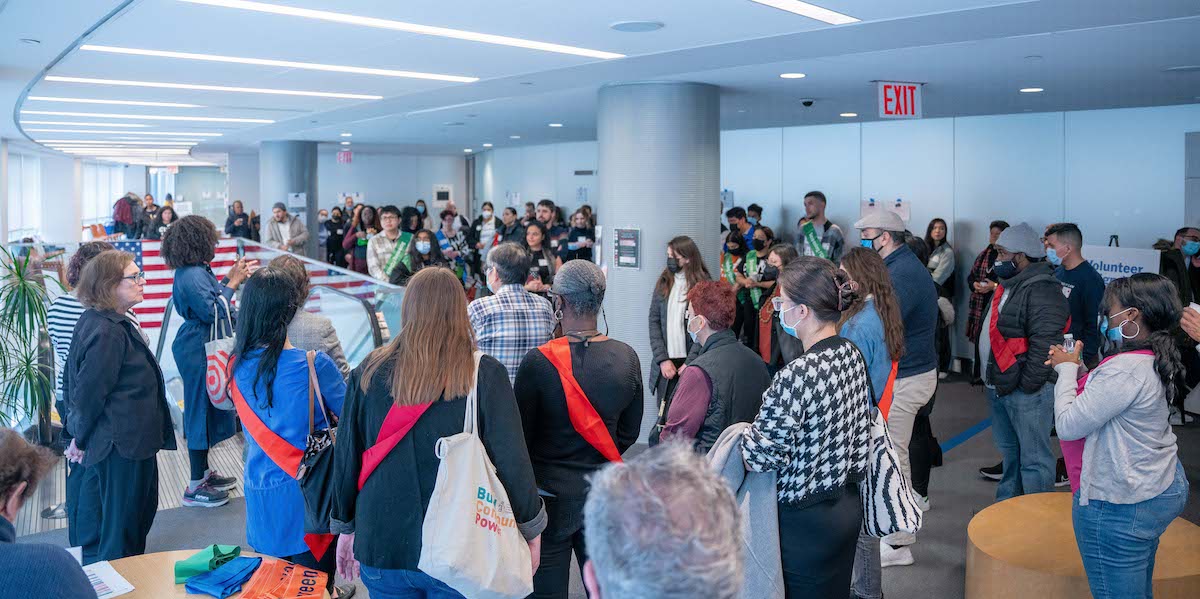

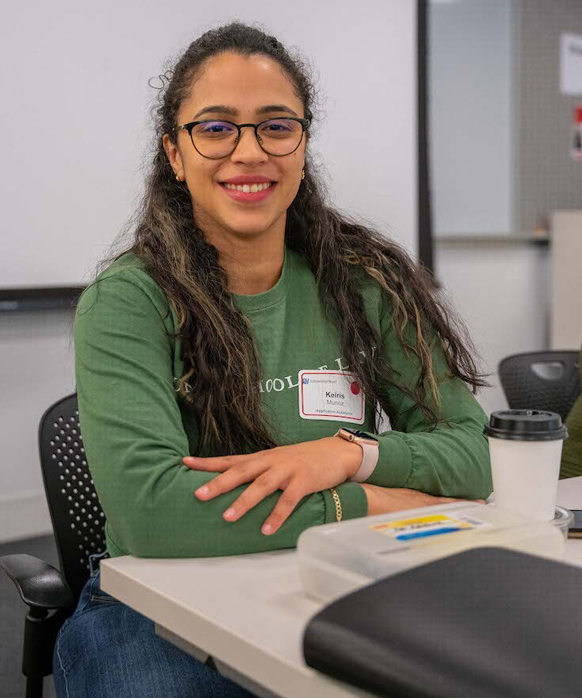 Keiris Munoz 2L
Keiris Munoz 2L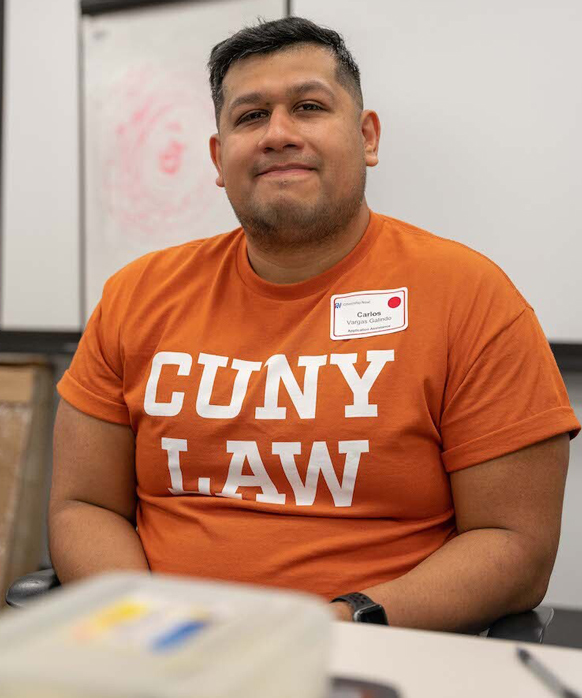 Carlos Vargas Galindo 3L
Carlos Vargas Galindo 3L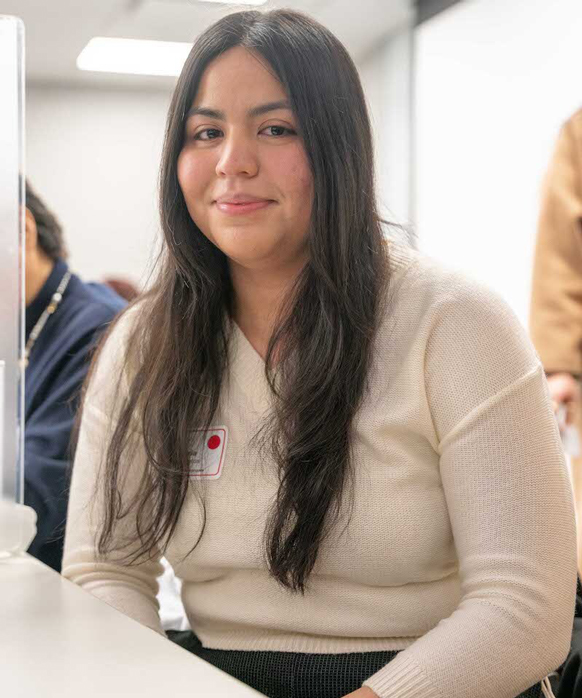 Maria Barrientos-Alonso 2L
Maria Barrientos-Alonso 2L